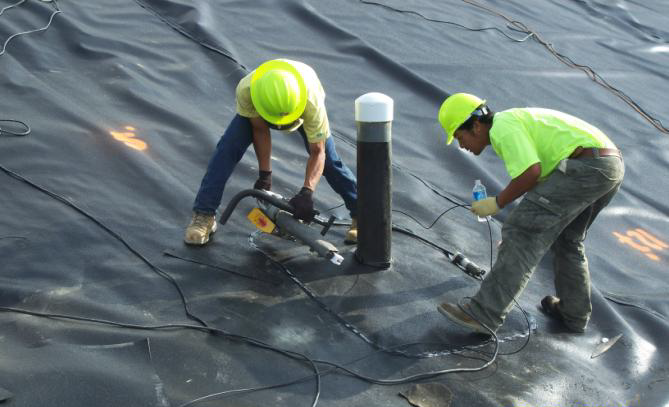High-density polyethylene (HDPE) liner CQA has been commonly selected as a synthetic barrier in securing the management of residual solid wastes. HDPE has been tested efficient in preventing the unrestricted release of contaminants in geomembrane installations.
Given its good chemical resistance characteristics, testing has shown that HDPE geomembrane is extremely resistant to the contaminated liquid that is generated from water percolating through a solid waste disposal site or residual solid waste landfills.
Records have shown that there have been instances when HDPE geomembranes in solid waste landfill double liner system that was constructed in 1988 was replaced due to its exposure to varying degrees of contamination.
Technicians have proven that samples of HDPE extracted from landfills were tested for physical and mechanical properties as part of HDPE Liner CQA program. Fortunately, these testings showed no degradation in properties of HDPE liners which strengthened the support for the selection of HDPE as the most efficient synthetic barrier component of this landfill liner system.
Installation of HDPE Liner CQA
Installation of HDPE Liner CQA should be constructed in accordance with the approved CQA Plan and specifications. Such testing includes material conformance testing to find out if the geomembrane conforms to the specifications such as thickness, density, tear resistance, puncture resistance, or the standard protocol in using HDPE liner CQA.
HDPE shows exceptional resistance to environmental stress, low temperature, anti-aging, corrosion, and a large operating temperature range to protect our water resource and environment. Given its ability to withstand environmental effects, HDPE is highly recommended by CQA technicians in the installation of landfills and geomembrane projects.
The process and quality of HDPE liner installation are very important in geomembrane projects. HDPE liner installations have been widely used in many projects in the world because it is a cost-effective geosynthetic product and it can meet the physical requirements of many projects.
HDPE installations can be used for many years and can be trusted due to their high strength, effectiveness, stable chemical properties, and longer service life and liners.
Manufacturers know the durability of geosynthetic products as well the environmental hazards that these installations face. Data have shown the necessity to perform HDPE Liner CQA when testings prove leaks in the projects particularly the contamination of liquid in waste disposals or landfills.





